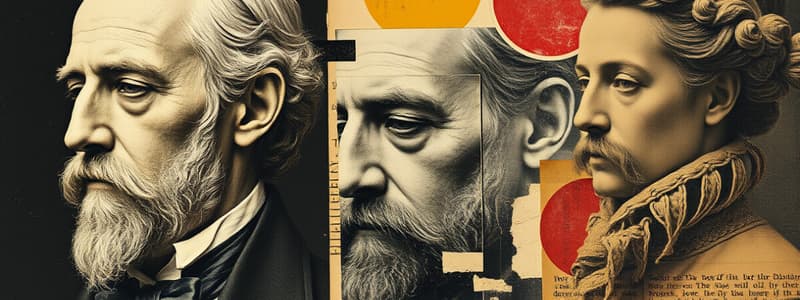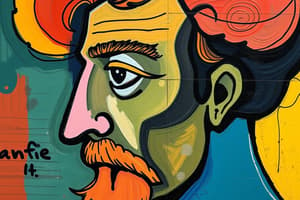Podcast
Questions and Answers
Which philosopher is associated with the idea that self is a product of brain activity independent of the body?
Which philosopher is associated with the idea that self is a product of brain activity independent of the body?
- Descartes
- Churchland (correct)
- Socrates
- Freud
Which of the following philosophers proposed the Bundle Theory regarding the self?
Which of the following philosophers proposed the Bundle Theory regarding the self?
- Augustine
- Plato
- Hume (correct)
- Aristotle
Who is known for the saying 'I think, therefore I am'?
Who is known for the saying 'I think, therefore I am'?
- Descartes (correct)
- Ryle
- Hume
- Kant
What does Augustine suggest is necessary for finding self-fulfillment?
What does Augustine suggest is necessary for finding self-fulfillment?
Which philosopher held the view that the self is often viewed as a 'ghost in the machine'?
Which philosopher held the view that the self is often viewed as a 'ghost in the machine'?
Which philosopher is best known for the concept of Tabula Rasa in relation to the self?
Which philosopher is best known for the concept of Tabula Rasa in relation to the self?
According to Ryle, how is the self demonstrated?
According to Ryle, how is the self demonstrated?
Which philosopher argued that the self consists of both an Inner Self and an Outer Self?
Which philosopher argued that the self consists of both an Inner Self and an Outer Self?
Flashcards are hidden until you start studying
Study Notes
Socrates
- Ancient Greek philosopher known for the maxim “Know thyself.”
- Emphasized introspection and self-examination as pathways to true wisdom.
- Believed that self-fulfillment is achieved through the understanding of the self in relation to God.
Augustine
- Theologian and philosopher who advocated the idea of self being deeply intertwined with divine grace.
- Suggested that understanding oneself is facilitated through one's relationship with God.
Hume
- Scottish philosopher known for challenging the notion of a permanent self.
- Proposed the Bundle Theory, arguing that the self consists of a collection of perceptions, thoughts, and sensations.
- Described the self as an illusion, dismissing the idea of a constant identity.
Ryle
- British philosopher who coined the expression "ghost in the machine" to critique Cartesian dualism.
- Asserted that the self is revealed through actions and behaviors rather than as a separate entity.
Plato
- Ancient Greek philosopher who posited the immortality of the soul.
- Supported the Tripartite Theory of the Soul, which includes rational, spirited, and appetitive elements.
Descartes
- French philosopher best known for the statement “I think, therefore I am.”
- Proposed dualism, suggesting a clear distinction between the mind and body.
Kant
- German philosopher who differentiated between the Inner Self (emotions and rational intellect) and the Outer Self (physical and sensory experiences).
- Emphasized the complexity of self-understanding encompassing both dimensions.
Churchland
- Canadian philosopher focused on neurophilosophy, positing that the self emerges from brain activity.
- Argued that the self is independent of the physical body, suggesting a scientific approach to identity.
Aristotle
- Ancient Greek philosopher who viewed the body and soul as inseparable, presenting a holistic view of the self.
Locke
- English philosopher introduced the concept of Tabula Rasa, suggesting that the self is shaped by experiences and perceptions.
Freud
- Austrian neurologist centered his analysis on the ego, exploring its role in shaping the self.
- Proposed that the ego mediates between primal desires and societal rules, contributing to individual identity.
Merleau-Ponty
- French philosopher who focused on the relationship between the self and the physical body.
- Suggested that self-awareness is heavily influenced by bodily sensations and experiences in the world.
Studying That Suits You
Use AI to generate personalized quizzes and flashcards to suit your learning preferences.




